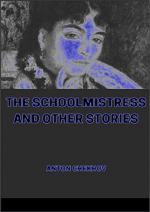The schoolmistress looked at him and could not understand why this queer man lived here. What could his money, his interesting appearance, his refined bearing do for him here, in this mud, in this God-forsaken, dreary place? He got no special advantages out of life, and here, like Semyon, was driving at a jog-trot on an appalling road and enduring the same discomforts. Why live here if one could live in Petersburg or abroad? And one would have thought it would be nothing for a rich man like him to make a good road instead of this bad one, to avoid enduring this misery and seeing the despair on the faces of his coachman and Semyon; but he only laughed, and apparently did not mind, and wanted no better life. He was kind, soft, naive, and he did not understand this coarse life, just as at the examination he did not know the prayers. He subscribed nothing to the schools but globes, and genuinely regarded himself as a useful person and a prominent worker in the cause of popular education. And what use were his globes here?
“Hold on, Vassilyevna!” said Semyon.
The cart lurched violently and was on the point of upsetting; something heavy rolled on to Marya Vassilyevna’s feet—it was her parcel of purchases. There was a steep ascent uphill through the clay; here in the winding ditches rivulets were gurgling. The water seemed to have gnawed away the road; and how could one get along here! The horses breathed hard. Hanov got out of his carriage and walked at the side of the road in his long overcoat. He was hot.
“What a road!” he said, and laughed again. “It would soon smash up one’s carriage.”
“Nobody obliges you to drive about in such weather,” said Semyon surlily. “You should stay at home.”
“I am dull at home, grandfather. I don’t like staying at home.”
Beside old Semyon he looked graceful and vigorous, but yet in his walk there was something just perceptible which betrayed in him a being already touched by decay, weak, and on the road to ruin. And all at once there was a whiff of spirits in the wood. Marya Vassilyevna was filled with dread and pity for this man going to his ruin for no visible cause or reason, and it came into her mind that if she had been his wife or sister she would have devoted her whole life to saving him from ruin. His wife! Life was so ordered that here he was living in his great house alone, and she was living in a God-forsaken village alone, and yet for some reason the mere thought that he and she might be close to one another and equals seemed impossible and absurd. In reality, life was arranged and human relations were complicated so utterly beyond all understanding that when one thought about it one felt uncanny and one’s heart sank.
“And it is beyond all understanding,” she thought, “why God gives beauty, this graciousness, and sad, sweet eyes to weak, unlucky, useless people—why they are so charming.”
“Here we must turn off to the right,” said Hanov, getting into his carriage. “Good-by! I wish you all things good!”




